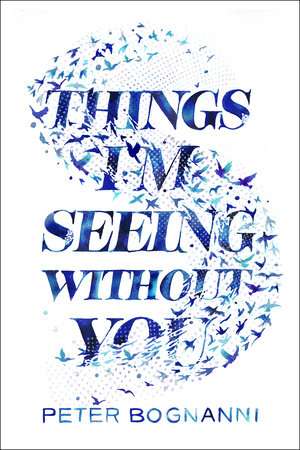 THINGS I’M SEEING WITHOUT YOU, by Peter Bognanni, Dial Books, Oct. 3, 2017, Hardcover, $17.99 (young adult)
THINGS I’M SEEING WITHOUT YOU, by Peter Bognanni, Dial Books, Oct. 3, 2017, Hardcover, $17.99 (young adult)
Things I’m Seeing Without You, by Peter Bognanni, is the second book I’ve recently read that has to do with grief and making poor decisions in the wake of said grief. Both included big journeys. The first felt far-fetched. The second (Things I’m Seeing Without You) is a bit more believable.
Tess Fowler is done with her Quaker school, so she does what any 17-year-old would do and walks away without looking back. In fact, Tess is done with pretty much everything.
Life as Tess knew it ended when Jonah, her “boyfriend,” ended his own life. Tess and Jonah only met once, but that was enough. Since then, the two would text and email each other in such a way that can only be described as a relationship.
Having nowhere else to go, Tess is crashing at her father’s and hiding from the world. And she can’t help thinking about Jonah, about what he would say in certain situations. So she keeps writing to him, sending her messages into the void. Knowing that she’ll never get a reply. Until she does.
Things I’m Seeing Without You is a bit weird. Tess’ parents — particularly her dad — are well meaning but extremely dysfunctional. Her mother is off on a soul-searching yoga trip in Asia, and her dad … well her dad plans funerals for animals.
For some reason, although I never could figure out quite why, Tess attends a Quaker school that seems very loose with rules. Her parents are all over the place with mom phoning it in — literally — and dad not quite sure what to do.
It’s not until she starts helping her dad with his funeral business that Tess begins to see life and death in a different way. Helping him not only takes the edge off her grief but it also opens the door to something way bigger.
When I started Things I’m Seeing Without You I seriously questioned whether I would read it all the way through. I didn’t like Tess. I couldn’t relate to her. But as the book progressed, universal themes of family, friendship, depression, loss, sorrow and anger evened things out.
Truthfully, I never did come around to loving Tess, but I did come to appreciate the challenges she faces. And I appreciated author Peter Bognanni’s exploration of how we honor those we lose.
